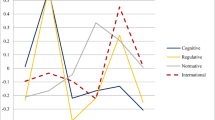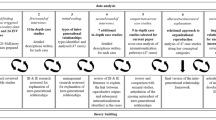Abstract
Based on the view that re-engineering and upgrading the institutional environment in previous command economies offer an important new frontier for boosting new venture creation and entrepreneurial internationalization, Laine and Kuivalainen examine and address institutional constraints to the internationalization of new ventures in Russia. It draws on 213 interviews with entrepreneurs and government officials, specifically regarding their perceptions and experiences of the impact of Russian institutional environment on entrepreneurial growth and internationalization. The study illuminates and discusses critical impediments to the growth and internationalization of new Russian ventures, providing practice-based insights on how the internationalization of entrepreneurial ventures might be facilitated through improvements in the institutional environment.
Access this chapter
Tax calculation will be finalised at checkout
Purchases are for personal use only
Similar content being viewed by others
Notes
- 1.
The interviews can be accessed by the following links: www.tinkov.com/bizsekrety and www.probusinesstv.ru/programs/75/
- 2.
Measured by GEM as the percentage of individuals who believe they have the required skills, knowledge and experience to start a new venture.
References
Aidis, R., Estrin, S., & Mickiewicz, T. (2008). Institutions and entrepreneurship development in Russia: A comparative perspective. Journal of Business Venturing, 23(6), 656–672.
Alon, I., & Rottig, D. (2013). Entrepreneurship in emerging markets: New insights and directions for future research. Thunderbird International Business Review, 55(5), 487–492.
Atkins, R. (2012). Judging economic performance in the G20. Financial Times. Retrieved from https://www.ft.com/content/6af76b28-3320-11e2-aa83-00144feabdc0
Barber, L., Buckley, N., & Belton, C. (2008). Laying down the law: Medvedev vows war on Russia’s ‘legal nihilism’. Financial Times. Retrieved from www.ft.com/intl/cms/s/0/4b93ecde-f9c3-11dc-9b7c-000077b07658.html#axzz3zKjGoOAc
Berglund, H. (2007). Researching entrepreneurship as lived experience. In H. Neergaard & J. P. Ulhoi (Eds.), Handbook of qualitative research methods in entrepreneurship (pp. 75–94). Cheltenham, UK: Edward Elgar Publishing.
Bell, J. (1997). A comparative study of the export problems of small computer software exporters in Finland, Ireland and Norway. International Business Review, 6(6), 585–604.
Berglund, H. (2015). Between cognition and discourse: Phenomenology and the study of entrepreneurship. International Journal of Entrepreneurial Behavior & Research, 21(3), 472–488.
Bruton, G. D., Ahlstrom, D., & Li, H. L. (2010). Institutional theory and entrepreneurship: Where are we now and where do we need to move in the future? Entrepreneurship: Theory and Practice, 34(3), 421–440.
Bullough, A., Renko, M., & Myatt, T. (2014). Danger zone entrepreneurs: The importance of resilience and self-efficacy for entrepreneurial intentions. Entrepreneurship Theory and Practice, 38(3), 473–499.
Busenitz, L. W., Gómez, C., & Spencer, J. W. (2000). Country institutional profiles: Unlocking entrepreneurial phenomena. Academy of Management Journal, 43(5), 994–1003.
Cope, J. (2005). Researching entrepreneurship through phenomenological inquiry: Philosophical and methodological issues. International Small Business Journal, 23(2), 163–189.
Cope, J. (2011). Entrepreneurial learning from failure: An interpretative phenomenological analysis. Journal of Business Venturing, 26(6), 604–623.
Davidsson, P., & Gordon, S. R. (2016). Much ado about nothing? The surprising persistence of nascent entrepreneurs through macroeconomic crisis. Entrepreneurship Theory and Practice, 40(4), 915–941.
DiMaggio, P. J., & Powell, W. W. (1983). The iron cage revisited: Institutional isomorphism and collective rationality in organizational fields. American Sociological Review, 48(2), 147.
Dyer, W. G., & Wilkins, A. L. (1991). Better stories, not better constructs, to generate better theory: A rejoinder to Eisenhardt. Academy of Management Review, 16(3), 613–619.
Giorgi, A. (1985). Phenomenology and psychological research. Pittsburgh, PA: Duquesne University Press.
Heidegger, M. (1962). Being and time. New York: Harper and Row.
Hendley, K. (2012). Who are the legal nihilists in Russia? Post-Soviet Affairs, 28(2), 149–186.
Jackson, G., & Deeg, R. (2008). Comparing capitalisms: Understanding institutional diversity and its implications for international business. Journal of International Business Studies, 39(4), 540–561.
Kafle, N. P. (2011). Hermeneutic phenomenological research method simplified. Bodhi: An Interdisciplinary Journal, 5(1), 181–200.
Kim, J. Y., & Miner, A. S. (2007). Vicarious learning from the failures and near-failures of others: Evidence from the U.S. commercial banking industry. Academy of Management Journal, 50(3), 687–714.
Lincoln, Y. S., & Guba, E. G. (1985). Naturalistic inquiry. Beverly Hills, CA: Sage.
van Manen, M. (1990). Researching lived experience: Human science for an action sensitive pedagogy. Albany, NY: State University of New York Press.
March, J. G., & Olsen, J. P. (1989). Rediscovering institutions: The organizational basis of politics. New York: The Free Press.
Miller, T., Holmes, K. R., & Feulner, E. J. (2013). Index of economic freedom. Washington, DC: The Heritage Foundation and Dow Jones & Company. Retrieved from http://www.heritage.org/index/pdf/2013/book/index_2013.pdf
Miller, T., & Kim, A. B. (2015). Index of economic freedom: Promoting economic opportunity and prosperity. Washington, DC: The Heritage Foundation and Dow Jones & Company. Retrieved from http://www.heritage.org/index/pdf/2015/book/index_2015.pdf
OECD. (2005). OECD SME and entrepreneurship outlook 2005. Paris, France: OECD Publishing. Retrieved from http://www.oecd-ilibrary.org/industry-and-services/oecd-sme-and-entrepreneurship-outlook-2005-edition_9789264009257-en
OECD. (2015). SMEs and entrepreneurship in the Russian federation. In Russian federation: Key issues and policies (pp. 47–64). Paris, France: OECD Publishing. Retrieved from http://www.oecd-ilibrary.org/industry-and-services/russian-federation-key-issues-and-policies/smes-and-entrepreneurship-in-the-russian-federation_9789264232907-6-en
Patton, M. Q. (2015). Qualitative research and evaluation methods (4th ed.). Thousand Oaks, CA: Sage.
Puffer, S. M., McCarthy, D. J., & Boisot, M. (2010). Entrepreneurship in Russia and China: The impact of formal institutional voids. Entrepreneurship Theory and Practice, 34(3), 441–467.
Safonov, S. (2014). Small and medium entrepreneurship in Russia. Luxembourg. Retrieved from http://www.eib.org/attachments/efs/econ_study_small_and_medium_entrepreneurship_in_russia_en.pdf
Seringhaus, R. (1987). The role of information assistance in small firms’ export involvement. International Small Business Journal, 5(2), 26–36.
Seymour, R. G. (2007). Hermeneutic phenomenology and international entrepreneurship research. Journal of International Entrepreneurship, 4(4), 137–155.
Singer, S., Amorós, J. E., & Moska, D. (2015). Global entrepreneurship monitor. Global Entrepreneurship Monitor–2014 Global Report. Retrieved from http://gemconsortium.org/docs/download/3616
Smith, J. A., Jarman, M., & Osborn, M. (1999). Doing interpretative phenomenological analysis. In D. M. Murray & K. Chamberlain (Eds.), Qualitative health psychology: Theories and methods (pp. 218–240). Thousands Oaks, CA: SAGE Publications Inc.
Szyliowicz, D., & Galvin, T. (2010). Applying broader strokes: Extending institutional perspectives and agendas for international entrepreneurship research. International Business Review, 19(4), 317–332.
Teece, D. J., Pisano, G., & Shuen, A. (1997). Dynamic capabilities and strategic management. Strategic Management Journal, 18(7), 509–533.
Verkhovskaia, O., & Dorokhina, M. (2014). Global entrepreneurship monitor: Russia 2013 (in Russian). St.Petersburg, Russia: Graduate School of Management. Retrieved from http://www.gemconsortium.org/report/49153
Volchek, D., Jantunen, A., & Saarenketo, S. (2013). The institutional environment for international entrepreneurship in Russia: Reflections on growth decisions and performance in SMEs. Journal of International Entrepreneurship, 11(4), 320–350.
Webb, J. W., Laszlo, T., Duane Ireland, R., & Sirmon, D. G. (2009). You say illegal, I say legitimate: Entrepreneurship in the informal economy. Academy of Management Review, 34(3), 492–510.
Witt, M. A., & Lewin, A. Y. (2007). Outward foreign direct investment as escape response to home country institutional constraints. Journal of International Business Studies, 38(4), 579–594.
World Bank. (2012). Enterprise surveys: Russian Federation country profile. Washington, DC. Retrieved from http://www.enterprisesurveys.org/~/media/GIAWB/EnterpriseSurveys/Documents/Profiles/English/Russia-2012.pdf
World Bank. (2016). Doing business 2016: Measuring regulatory quality and efficiency. Economic Profile 2016. Washington, DC: World Bank Group. Retrieved from http://www.doingbusiness.org/~/media/GIAWB/Doing Business/Documents/Annual-Reports/English/DB16-Full-Report.pdf
Yamakawa, Y., Peng, M. W., & Deeds, D. L. (2008). What drives new ventures to internationalize from emerging to developed economies? Entrepreneurship Theory and Practice, 32(1), 59–82.
Author information
Authors and Affiliations
Editor information
Editors and Affiliations
Rights and permissions
Copyright information
© 2017 The Author(s)
About this chapter
Cite this chapter
Laine, I., Kuivalainen, O. (2017). The Internationalization of New Russian Ventures: The Institutional Frontier. In: Ibeh, K., Tolentino, P., Janne, O., Liu, X. (eds) Growth Frontiers in International Business. The Academy of International Business. Palgrave Macmillan, Cham. https://doi.org/10.1007/978-3-319-48851-6_7
Download citation
DOI: https://doi.org/10.1007/978-3-319-48851-6_7
Published:
Publisher Name: Palgrave Macmillan, Cham
Print ISBN: 978-3-319-48850-9
Online ISBN: 978-3-319-48851-6
eBook Packages: Business and ManagementBusiness and Management (R0)




